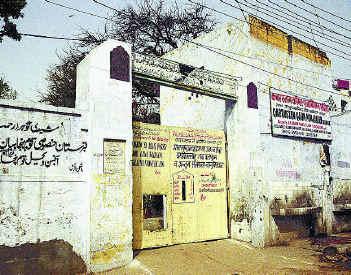NEW DELHI :
Proud to be Punjabi. That’s the well-heeled Punjabi community of the Capital, a community with established business interests, its own way of living, its own burial ground, says VIVEK SHUKLA….

A MUSLIM family along with their friends and relatives recently went to a burial ground in Shiddipura near Idgah mosque known as Qabristan Qaum Punjabian for the last rites of a relative. They were, however, told by the guard of the burial ground that this place is only for Delhi’s Punjabi Muslim community.
Principal of Delhi University’s Zakir Hussain College, Prof. Riaz Umer, who is also the president of the Anjuman Vakile Qaum Punjabian of Delhi, the organisation looking after the institutions run by this community, informs that other than their own community members they only allow the burial of somebody who has made a significant contribution for their community.
This is a very unique community as Punjabi Muslims still vigorously preserve their own identity. The elders of Punjabi Muslim community came here for the first time in mid-17th Century from a place called Bhera in West Punjab, now in Pakistan. They were Khatri Hindus with surnames like Khanna, Channa, Sapra, Baluja, Saluja, Sehgal, Mehndiratta, Bahri and Sachdeva, etc., before embracing Islam.
Legend has is that a group of Punjabi Khatris from Bhera was going to Haridwar for a holy dip in Ganga. On the way, they met Sufi Shamsuddin Tabrez who asked where were they going. When he was told by the Khatris about their plan, the saint reportedly asked whether they would become Muslim if he brought the Ganga right there. The Hindu Khatris accepted his offer and the saint literally brought the Ganga there and then the awe-struck Hindus as promised converted to Islam.
S.M. Abdullah, a prominent member of Delhi’s Punjabi Muslim community, says that while it is true that their forefathers embraced Islam, nevertheless they vigorously guard their exclusive heritage. “Come, what may, Punjabi Muslims will not marry outside the community. We ensure that the bride or groom’s family is Punjabi Muslim, that too from Bhera,” says Abdullah, proudly adding that his surname is Mehndiratta.
It is said that 64 Punjabi Muslim families came to Delhi at the outset. They set up their base somewhere around the present-day Shalimar Bagh. The male members started going downtown to find work. “With the passage of time they started doing small jobs here but were rather shabbily treated by the locals as they were not sophisticated enough to communicate with the more refined and cultured Delhiwallahs,” says Nasser, another member of this dwindling community and a leading model.
According to Abdullah, the Punjabi Muslims’ big time came when the Moghul Emperor Bahadur Shah Zafar was looking for some rare herb called Bahadra. When only the Punjabi Muslims could provide the herb, the king and his courtiers were really surprised. He called important members of this community and asked them whether they wanted anything from him. The Punjabi Muslims, among other things, sought permission to do business in downtown Delhi and a separate piece of land for their burial ground. The demand for business was granted and land was allotted to them near the present-day Raj Niwas, the official bungalow of Delhi’s Lt. Governor for burials. Once the first ground was full, another burial ground was made near the historic Idgah mosque at Shiddipura. Known as Qabristan Qaum Punjabian, the burial ground can only be used by Punjabi Muslims. There is no place for any non-Punjabi here.
It is said that 75 per cent of the Walled City belongs to this community. Except for a handful of doctors, teachers, engineers and advocates, they are all into business. Once G.B. Road was almost totally owned members of Punjabi Muslims. After Partition, many of them left India and the authorities confiscated their properties.
The famous Marina Hotel is also partially owned by one Haroon Japanwala while the famous Dehalvi family of Shama Publications fame are also Punjabi Muslims.
The historic Hardinge Library is also said to be financed by one Buksh Elahi, a cigarette merchant. He also belonged to this community.
The Punjabi Muslims community also conducts its own census every 10 years. According to the latest census report, the total population of this community in Delhi is 5090. The literacy rate is over 50 per cent. It is more than the literacy rate of Muslims in the Capital.
source: http://www.thehindu.com / The Hindu / Home> Metro Plus Delhi – online edition / by Vivek Shukla / March 06th, 2003








